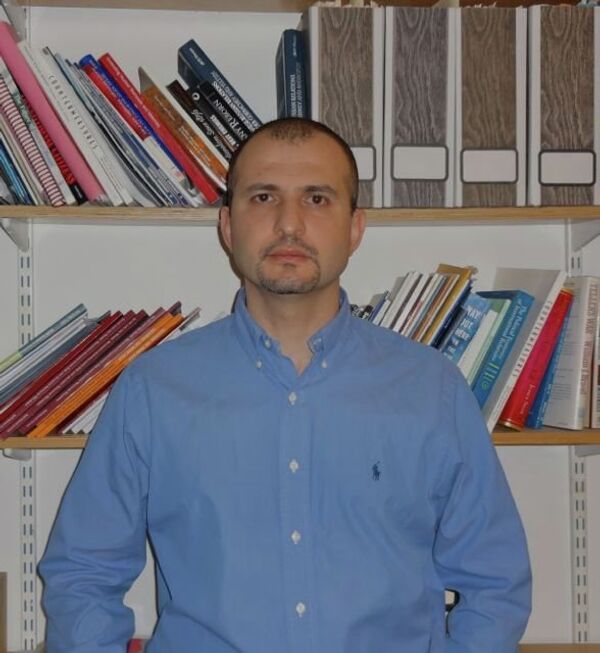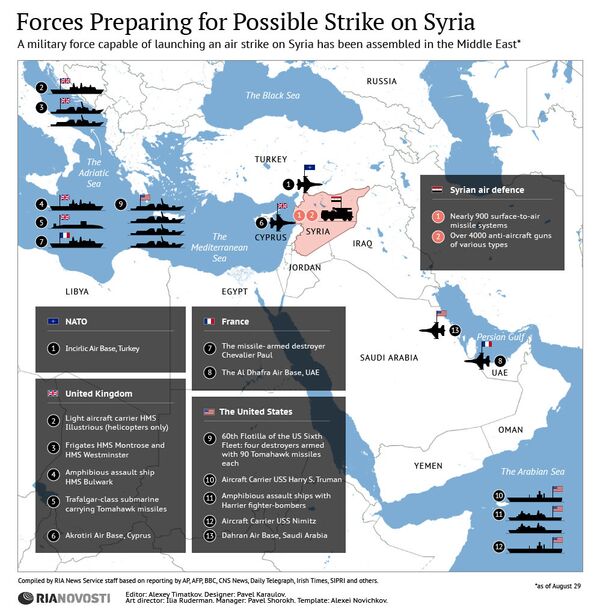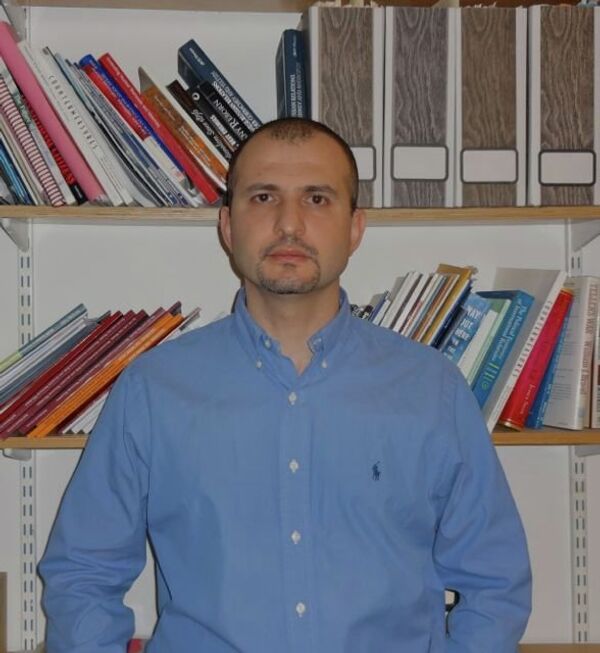So the die seems to have been cast. The US military is set to intervene in the Syrian civil war to punish the regime of Bashar Assad for crossing the red line that President Barack Obama drew so publicly by allegedly using nerve gas that the opposition says killed more than 1,000 in Damascus on August 21.

An investigation launched by the United Nations into the use of chemical weapons (CW) has yet to report back with its findings, but the debate in Washington has already shifted to “when” rather than “whether” the US will strike Syria even though Obama cautioned on Wednesday that he was yet to make a decision on this issue.
This might be what the Obama administration officials really mean when they promise that the military response to the August 21 attack will not involve a regime change. If the Syrian army did gas innocent civilians, then it would be both just and reasonable to punish the Assad regime for such an atrocity and deter it from resorting to any kind of chemical warfare agents in the future. But, of course, once the US strike occurs, it would be difficult for the US president to prevent the subsequent “mission creep” that has happened during the rule of his predecessors time and again.
Once Obama has yielded to pressure at home and abroad to use force in Syria, it would be hard for the Commander-in-Chief to avoid using it again or expanding list of targets.
And what if the Assad regime refuses to fall even after a protracted bombing campaign? Syria is not exactly Libya, and air support for rebels will not suffice this time. Not only does Assad’s army have more advanced air defense systems, it also enjoys staunch support from the Alawite militias and Hezbollah, both of which have proved quite capable of taking on the opposition forces.
Will the Obama administration first send advanced weapons and, if that doesn’t help defeat Assad, will it put US boots on the ground?
And suppose Syria’s stubborn strongman is finally defeated, wouldn’t it make sense for the United States and its allies to first help the moderates among the disparate groupings that oppose Assad to ascend to power in Damascus? And to then help them put an end to the vestiges of support for Assad and reign in the extremists?
Obama would be less than pleased to see his country become drawn into another futile nation-building exercise, especially after Afghanistan and Iraq – both of which were high on costs and low on results. But he cannot risk another failed state emerging in Greater Middle East (GME), especially if some of the opposition forces in Syria have links to al-Qaida, can he? US-led nation-building in Syria would spell the end of Obama’s dream of extricating the US from the region so that America can focus on the pivot to Asia.

Regime change achieved with use of American force would also have negative consequences for the United States outside the Greater Middle East.
This would reinforce Tehran’s belief that the only way it can escape the fate that may befall its ally and neighbor (Assad’s Syria) is to acquire nuclear weapons. It would also, of course, further complicate America’s already uneasy relationship with Russia. And while Russia will continue to cooperate with United States on issues it views as beneficial (such as stability in Afghanistan) Moscow, which has a lot to lose in Syria (as my previous column outlined), may change its stance on other issues, such as exports of air defense systems to Iran.
To avoid a disastrous mission creep Obama, as President, should do everything he can to resist the pressure that neocons and interventionists in his own camp are ratcheting up – and limit the use of force in Syria..
Atrocities by the Assad regime make it unfathomable to follow the advice that is given in conflict resolution textbooks written by realists, i.e. that the quickest way to end a conflict is to side with the strongest side. That doesn’t mean though that the US cannot agree to a negotiated post-Assad arrangement, in which “his” forces, such as the Alawites, get fair representation.
Hopefully, the strikes will ensure Assad gets the message this time and negotiates his departure whenever (or indeed if) the Geneva-2 peace conference, which US and Russian diplomats have been trying to arrange since June, finally takes place.
Reconciling parties to a conflict, in which even moderate factions commit such atrocities as cannibalism and gassing non-combatants is sure to be extremely difficult. But, short of the outright annihilation of one side by the other, it seems the only way to prevent Syria from becoming what has been described as a Somalia of the Mediterranean.
Simon Saradzhyan is a researcher at Harvard Kennedy School's Belfer Center. His research interests include international security, arms control,
counter-terrorism as well as political affairs in post-Soviet states and their relations with major outside powers. Prior to joining the Belfer Center in 2008 Saradzhyan had worked as deputy editor of the Moscow Times and a consultant for the United Nations and World Bank. Saradzhyan holds a graduate degree from the Harvard University.
The views expressed in this column are the author’s alone.
View From the Global Tank: Obama-Putin: Now It's Personal?
View From the Global Tank: Our Changing World Order – the More Options for Cooperation, the Merrier
View From the Global Tank: Appointing Rice, Power Won’t Alter Obama’s Policy on Syria, Russia
View From the Global Tank: Missile Defense Need Not Derail US-Russian Relationship
View From the Global Tank: The Last Chance to Prevent a Mediterranean Somalia
View From the Global Tank: Boston Bombing Puts Spotlight on Security Services’ Failure to Cooperate
View From the Global Tank: Europe Ignores Collective Security System Flaws at Own Peril
View From the Global Tank: Why Nuclear Powers Should Start Walking Toward Global Zero
View From the Global Tank: Russia Needs to Develop Eastern Provinces as China Rises

